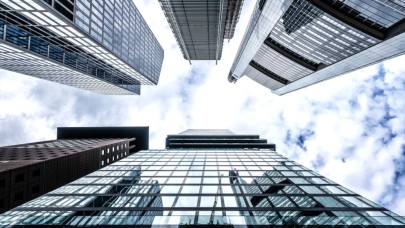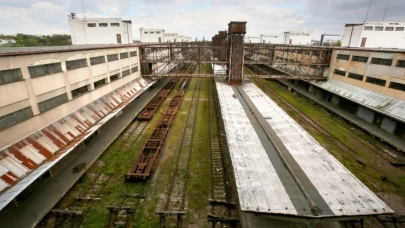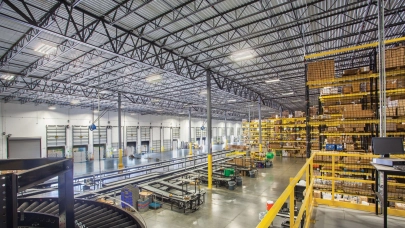
We have previously published insights on the recovery efforts in Ukraine, and we would like to share some remarkable examples of how commercial projects damaged by missile attacks are being rebuilt. Shopping malls, office buildings, and logistics centres are often prime targets during hostilities, yet Ukrainian businesses are showcasing extraordinary resilience as evidenced in this summary prepared by the Ukrainian Real Estate Club for Property Forum.
The initial months of the full-scale invasion in 2022 saw numerous attacks on commercial properties. Many logistics sites were severely damaged in the Kyiv region, while various shopping malls and hotels suffered destruction across the country. Below are some inspiring stories of the reconstruction of commercial buildings. Regrettably, this rebuilding process lacks support from any state programme, leaving private investors to shoulder the financial burden. Property insurance typically does not cover risks associated with war damage.
On March 9, 2022, a Russian missile struck the roof of the Nikolsky shopping centre in Kharkiv, igniting a fire on the fourth floor of the mall that was swiftly contained. Fortunately, no injuries were reported as the shopping centre was empty at the time of the attack. The missile caused extensive damage, destroying a ventilation chamber on the fifth floor and impacting two additional floors. The dome, façade, nearly half of the climate and ventilation systems, glass structures on the façade, and multimedia screens were all affected. Inside, the explosion nearly obliterated the atrium fence, numerous glass shopfronts, and finishes across the second to fourth floors.
By late September 2022, the first and second floors reopened to visitors, followed by the third floor at the end of October. The fourth floor was inaugurated in November alongside a Multiplex cinema, sports centre, bowling alley, and food court. The complete renovation was finalised in 2023.
Epicentr, Ukraine's largest DIY centre developer and operator, reported damage to seven shopping centres since February 2022 across Mariupol, Chernihiv, Bucha, Nikopol, Kharkiv, and two locations in Kherson, totalling over 125,600 square metres. Two shopping centres in Kramatorsk and Kharkiv remain temporarily closed due to damage and their proximity to active combat zones; their combined area is 46,500 square metres. Another shopping centre in Melitopol (5,430 square metres) is currently under occupation. Consequently, Epicentr has lost ten facilities that have been completely destroyed or damaged; their total area exceeds 177,500 square metres.
The company is committed to rebuilding all shopping centres that have been impacted by hostilities. However, immediate reconstruction is not feasible everywhere; Mariupol is still occupied while Nikopol and Kherson face ongoing shelling from Russian forces. Nonetheless, renovated shopping centres have already reopened in Chernihiv and Bucha—areas that experienced significant destruction.
The logistics real estate market in Ukraine has also faced severe repercussions due to hostilities. Approximately 373 thousand square metres—23% of the entire professional warehouse market in Kyiv—have been destroyed by Russian aggressors. Three out of eleven warehouses within our portfolio were lost (116 thousand square metres out of a total of 391 thousand square metres). West Gate Logistic stands as our largest complex; it was almost entirely devastated in March 2022,” explains Dmitry Kalinichev, Commercial Director of Dragon Capital Property Management. In less than three months into 2022, the company managed to repair and reopen its front building. By 2024, the entire complex was acquired by retail operator Aurora, which plans to restore the second building. This complex encompasses a 14.4-hectare land plot with office and warehouse space approximating 7,000 square metres alongside a demolished structure measuring 90,000 square metres—one of the largest warehouse facilities in Kyiv.
These examples represent just a fraction of the rapid recovery efforts for commercial properties in Ukraine; many others await reconstruction—particularly offices and hotels. The potential for property insurance covering war risks could serve as a viable solution.
Insurance coverage for war risks
Traditionally, insurers offer businesses universal “all-risk” coverage which activates when losses occur for reasons not explicitly excluded from coverage. Typically among these exclusions are war risks. To address this gap, specialised coverage exists to protect against risks linked to armed conflict—known as PVI (war terrorism and civil unrest insurance). The country has already incurred losses exceeding UAH 2 trillion and currently faces one of the highest risk levels according to Political Risk Maps compiled by various experts. Nevertheless, protecting businesses from wartime risks remains critically important; thus Ukrainian insurers are beginning to collaborate more closely. Through coinsurance and reinsurance arrangements, they aim to tackle war risks while gradually increasing insurance coverage limits; presently around five to six Ukrainian insurers are engaged in this initiative.



